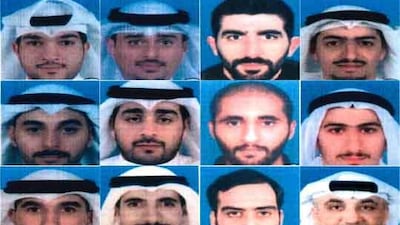Kuwait has asked Iran to reduce its diplomatic presence in the country as security forces hunt 15 Kuwaiti nationals and an Iranian who were convicted of espionage and other activities against the state.
The Kuwaiti foreign ministry on Thursday issued an order for 15 of the Iranian embassy's 19 diplomats to leave the country within 45 days. The ministry also froze all cooperation with Iran, Kuwait’s state news agency reported.
Sheikh Mohammed Abdulla Al Sabah, minister of state for cabinet affairs, said the reduction in diplomatic ties was to preserve Kuwaiti rights.
The Iranian foreign ministry said it had summoned Kuwait's charge d'affaires in Tehran for clarification and to protest over the reduction in Iranian embassy staff, Iran's Irna news agency reported.
On Wednesday, the Kuwaiti interior ministry said 15 Kuwaitis, all Shiites and linked to a cell uncovered in 2015 that was spying for Iran and Hizbollah, had gone missing along with an Iranian who was also convicted in the case.
The interior ministry said security forces had begun raiding potential hideouts throughout the country, and urged citizens and residents to cooperate by providing any information about the fugitives. Those found helping them would face prosecution, it said.
Parliament held an emergency joint session on Thursday after the ministry's revelation and called for “ministers to resign” or else face questioning.
The fugitives, who had appealed their convictions, were released in February but barred from leaving the country, the Kuwaiti daily Al Jarida reported.
The 16 men are linked to the so-called Abdalli terrorist cell, named after the northern area of Kuwait where security forces discovered the largest cache of guns and bombs ever found in the country in 2015.
A Kuwait lower court last year convicted 23 out of 26 suspects linked to the terror cell of crimes including spying for foreign entities, trading in weapons and training with firearms with intent to commit violence. Two men were given death sentences that were later reduced to life in prison, while the others were sentenced to between five years and life in jail. The convictions were overturned on appeal several months later.
However, the supreme court last month overturned the acquittals of the 16 men now on the run, and sentenced one of them to life, another to 15 years, and rest to 10 years each.
Iran has denied any links to the cell, but Kuwaiti officials have accused Tehran of trying to interfere in domestic affairs by infiltrating local Shiite communities.
Relations between Kuwait's Sunni and Shiite populations are less strained than in some other Gulf Arab countries, which has been attributed to stronger national unity forged from hardships endured during the 1991 Gulf War.
However, foreign actors have often tried to spark conflict among Kuwait's Sunni-majority 1.4 million population.
The Sunni extremist group ISIL carried out a suicide bombing at a Shiite mosque in 2015 that killed 27 people and injured 227 in the the worst terror attack in Kuwait’s history.
Kuwait's 87-year-old emir, Sheikh Sabah Al Ahmed, arrived at the scene within 15 minutes of the bombing, a move viewed by Kuwaitis as key to quelling any sectarian backlash that might have resulted from the attack.
Shortly afterwards, the Sunni monarch called for increased social cohesion and pushed to crack down on terrorist groups in the country.
Within two weeks of the bombing at Al Imam Al Sadiq mosque, security forces uncovered the Abdali cell during raids on farmhouses near Kuwait’s border with Iraq.
Shortly afterwards, 25 nationals and the Iranian were charged with links to Iran and spying for Hizbollah, the Iran-backed Shiite militant group in Lebanon.
Saudi Arabia along with the UAE, Bahrain and Egypt have cited Qatar’s close relations with Iran as one of the reasons for cutting diplomatic ties with Doha on June 5.
Sheikh Sabah is acting as chief mediator in the row between the Gulf countries and remains hopeful that the impasse can be resolved.
Kuwait has managed to successfully balance its strong relationship with Saudi Arabia while making steps towards improving relations with Riyadh’s arch-rival Iran, despite a series of Iran-linked terror attacks in the 1980s.

